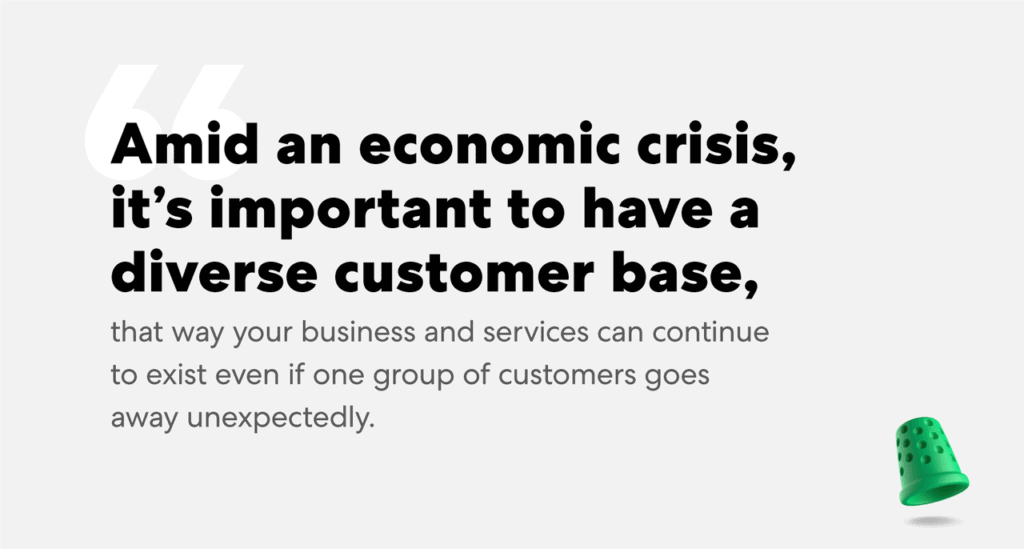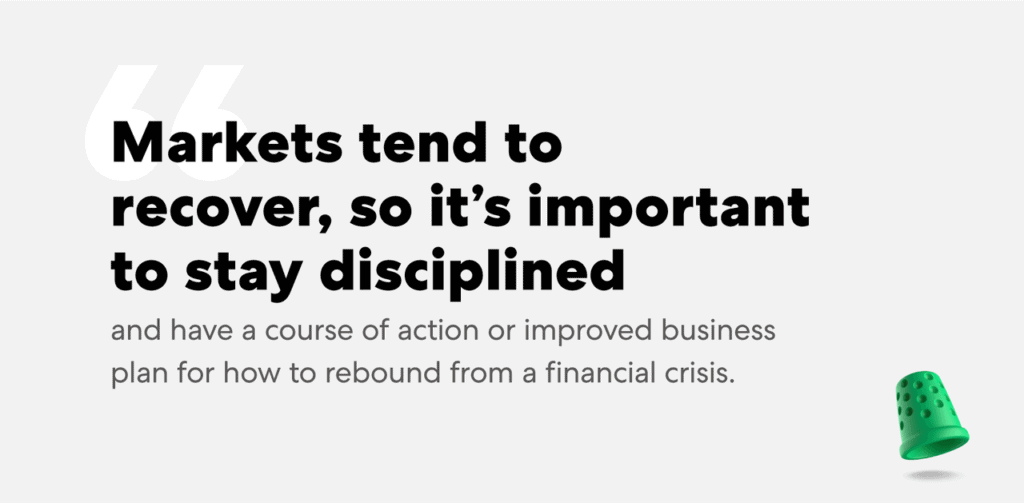When building your business, there are several challenges that you can expect to face—like hiring reliable employees, and working within your budget to create a profitable business. Some business obstacles, however, are unexpected. Take an economic downturn, for instance.
While economic downturns tend to affect everyone in some way or another, business owners seem to always bear the brunt of it. Entrepreneurs who have experienced a financial crisis, such as the Great Recession, know this all too well. During the Great Recession, approximately 1.8 million businesses went bust from December 2008 to December 2010.1 Those that survived had to get creative to stay afloat.
As the global economy undergoes the worst recession since World War II due to Covid-19, we wanted to get to the bottom of how small businesses can weather the storm.2 Using hard-earned lessons from entrepreneurs who survived the Great Recession and other financial crises, we’ve compiled advice that every business owner could benefit from to ensure you’re prepared for the unexpected. Read on or skip to our infographic to discover how your small business can survive the current financial crisis.
Lesson 1: diversify your investments

During the Great Recession, Americans and entrepreneurs learned not to invest all of their funds in one place when the stock market suffered catastrophic financial losses — causing many people to lose significant portions of their life savings and investments. Simply put, a diverse portfolio of investments is the best defense against a volatile market. This means having a mix of investments in different areas to help limit the potential for financial distress that comes from a single failed asset.
The key when diversifying your investments is to invest in different areas such as stocks, products or businesses that would each react differently to the same event, in order to maximize your returns. Andrew Creme, a financial advisor and author, reveals that, “owning a business is no different than investing in publicly traded companies. You don’t want all your business coming from one market segment and certainly not a highly concentrated income from a single source.”
Lesson 2: preserve cash and reduce debt
When getting into a business, it’s common to acquire debt. However, it’s important to preserve cash and reduce debt as soon as possible. Studies show that companies with high levels of debt are especially vulnerable during a recession.3
Why? Recessions often lead to smaller profits, and if your cash flow dries up, it could lead to the end of your business. Once your business starts making money, you’ll want to reduce your debt as soon as possible. Ultimately, the entrepreneurs who were successful in the 2008 recession were the ones that were not overly leveraged and so were able to stay agile during tough times.4
Lesson 3: expand your clientele portfolio

To be successful in times of economic downturn, it’s important to have a diverse customer base or different types of clients that can survive. That way, your business and services can continue to exist even if one group of customers is struggling or goes away unexpectedly. More clients also means more sales and a greater chance of customer loyalty when an economic downturn comes along.
Drew Moreland, an Account Services Manager at Coast Label Company, suggests putting your company in a position to work with different types of clients that will not all be affected in the same ways during times of financial crisis. After seeing an economic downturn at the start of the COVID-19 pandemic he recalled, “while some of our customers struggled, others had higher demand due to the pandemic. That enabled us to shift much of our work to those clients.”
Lesson 4: focus on customer relationships
During a recession, businesses usually need to put in extra effort to sell their products to customers or gain visibility. However, building a loyal customer base can help you maintain sales even during tough times. One efficient and cost effective way to do this is to leverage social media.
The internet never sleeps, so your social media pages can engage with customers, gather feedback, and keep customers in the loop at all times. Engaging with customers online and using their feedback to improve your business could create more satisfied and loyal customers. If done correctly, social media can not only help you build relationships with your customers, but it can also help improve awareness and trust in your brand — all beneficial for times of crisis.
Another great way to improve customer relationships and retention is to show your appreciation. This could be as simple of expressing your gratitude with handwritten and personalized thank you notes or creating reward programs or discounts for returning customers. Building rapport with your customers is a good strategy to ensure customer retention and have more stability during a recession or economic downturn.
Lesson 5: invest in advertising and marketing

One mistake that many businesses make during an economic downturn is to cut back on advertising and marketing. However, businesses with little or no market presence during a recession are likely those that will be most affected. Maintaining your brand’s presence gives you an opportunity to secure a significant lead over your competitors who may not be taking the same strategy.
Research from past recessions shows us that there are many advantages of maintaining or increasing ad budgets during a weaker economy.5 For instance, during times of economic downturn, the “noise level” in a brand’s product category can drop when competitors cut back on ad spend, allowing businesses to gain more recognition and introduce themselves to new customers. Additionally, the cost of advertising and marketing tends to drop during recessions, creating a “buyer’s market” for businesses looking to expand their brand’s presence.
Lesson 6: look beyond layoffs to cut costs
Layoffs aren’t just harmful to workers and morale, they’re costly for businesses as well. While layoffs might be a short-term solution to a financial crisis, it’s important to note that when the market recovers, you’ll have to rehire and retrain employees which can cost significant time and money. Additionally, layoffs affect company morale, which can also impact productivity.
Fortunately, layoffs aren’t the only way to cut labor costs in a business. To survive a recession, consider hour reductions, furloughs and performance pay. Cutting down expenses instead of employees is also a great way to save money when your business is strapped for cash. This can be a good time to evaluate your spending and prioritize what will give you the best return on investment — which can significantly help your financial situation in the long-run, even after a recession is over.
Like many businesses having down time during Covid-19, Patrick Tanner, Co-Founder at Missouri House Buyers states, “We used the quarantine time to thin down some things we had been paying for in-house that just weren’t a top priority anymore. We stopped some of our more expensive lead source channels but only to ramp up the more personalized ones.”
Lesson 7: prepare for the market to recover

Finally, when you’re a business owner undergoing a financial crisis, it’s important to stay disciplined and keep working. If there’s one constant thing we’ve learned from the economic downturns, is that markets tend to recover. Continuing to improve and protect your business is the only way to recover and be successful long term.
According to Stephen Halasnik, Managing Partner at Financing Solutions, “you should keep working to improve your business during a recession, so that when the recession is over, you are able to grow substantively.”
Having a course of action or improved business plan for how to bounce back from a recession is a way to continue to work on your business. It can even help you add some control to what can feel like an uncontrollable situation. This can also help you decide if your business will be profitable once the market recovers or if it’s time to pivot.
During times of crisis, it’s easy to panic, but making the right decisions for your business today can help you achieve your objectives tomorrow. Whether it’s an economic downturn or an unexpected accident, it’s important to protect your business and set it up for success ahead of a potential crisis. To learn more about preparing for a crisis or preventing a financial loss, visit Thimble.

Sources:
- Investopedia. 10 Years After the Financial Crisis: The Impact on Small Business
- The World Bank. COVID-19 to Plunge Global Economy into Worst Recession since World War II.
- The Quarterly Journal of Economics. Firm Leverage, Consumer Demand, and Employment Losses During the Great Recession.
- Nick Ron. House Buyers of America.
- Advertising Speciality Institute. It seems like common sense, if you advertise when everyone else stops marketing…








